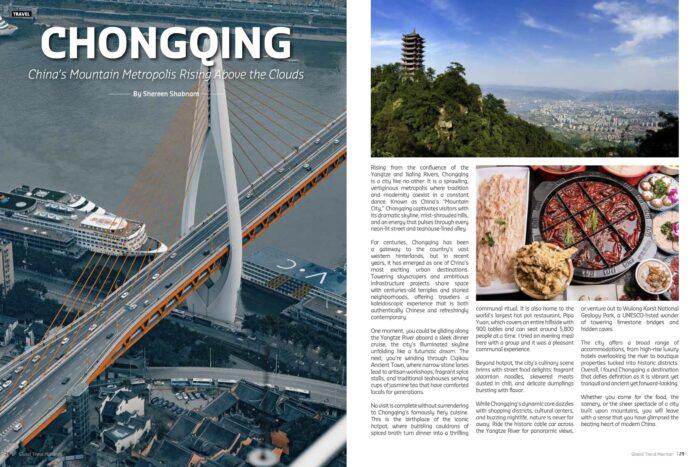Shereen Shabnam
Rising from the confluence of the Yangtze and Jialing Rivers, Chongqing is a city like no other. It is a sprawling, vertiginous metropolis where tradition and modernity coexist in a constant dance. Known as China’s “Mountain City,” Chongqing captivates visitors with its dramatic skyline, mist-shrouded hills, and an energy that pulses through every neon-lit street and teahouse-lined alley.
For centuries, Chongqing has been a gateway to the country’s vast western hinterlands, but in recent years, it has emerged as one of China’s most exciting urban destinations. Towering skyscrapers and ambitious infrastructure projects share space with centuries-old temples and storied neighborhoods, offering travelers a kaleidoscopic experience that is both authentically Chinese and refreshingly contemporary.
One moment, you could be gliding along the Yangtze River aboard a sleek dinner cruise, the city’s illuminated skyline unfolding like a futuristic dream. The next, you’re winding through Ciqikou Ancient Town, where narrow stone lanes lead to artisan workshops, fragrant spice stalls, and traditional teahouses serving cups of jasmine tea that have comforted locals for generations.
No visit is complete without surrendering to Chongqing’s famously fiery cuisine. This is the birthplace of the iconic hotpot, where bubbling cauldrons of spiced broth turn dinner into a thrilling communal ritual. It is also home to the world’s largest hot pot restaurant, Pipa Yuan, which covers an entire hillside with 900 tables and can seat around 5,800 people at a time. I tried an evening meal here with a group and it was a pleasant communal experience. Beyond hotpot, the city’s culinary scene brims with street food delights: fragrant xiaomian noodles, skewered meats dusted in chili, and delicate dumplings bursting with flavor.
While Chongqing’s dynamic core dazzles with shopping districts, cultural centers, and buzzing nightlife, nature is never far away. Ride the historic cable car across the Yangtze River for panoramic views, or venture out to Wulong Karst National Geology Park, a UNESCO-listed wonder of towering limestone bridges and hidden caves.
The city offers a broad range of accommodations, from high-rise luxury hotels overlooking the river to boutique properties tucked into historic districts. Overall, I found Chongqing a destination that defies definition as it is vibrant yet tranquil and ancient yet forward-looking. Whether you come for the food, the scenery, or the sheer spectacle of a city built upon mountains, you will leave with a sense that you have glimpsed the beating heart of modern China.
